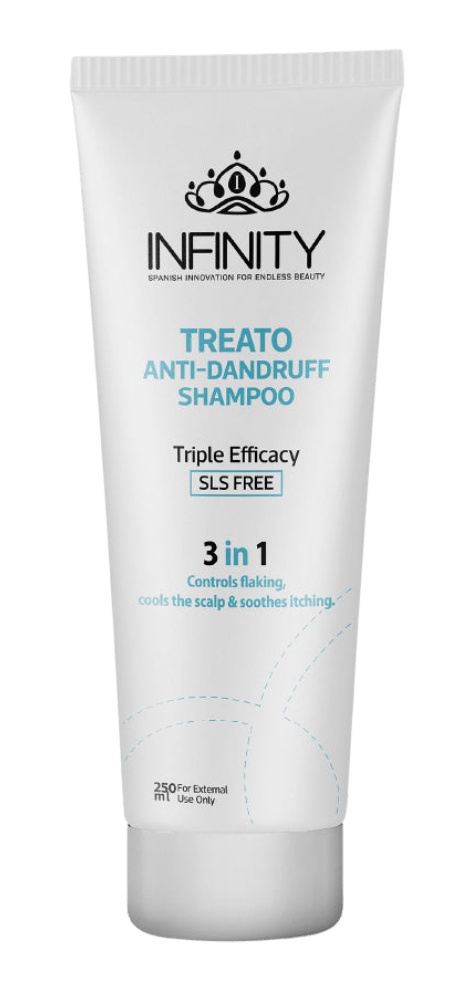
Highlights
Skim through
| Ingredient name | what-it-does | irr., com. | ID-Rating |
|---|---|---|---|
| Zinc Pyrithione | preservative | ||
| Argan Oil | antioxidant, emollient | goodie | |
| Mink Oil | 1, 2-3 | ||
| Shea Butter | emollient | goodie | |
| Biotin | |||
| Collagen | moisturizer/humectant | goodie | |
| Black Seed Oil | soothing, antioxidant, emollient, perfuming | goodie | |
| Hydrolyzed Soy Protein | moisturizer/humectant | ||
| Emu Oil | |||
| Polyquaternium-67 | |||
| Vitamin E | antioxidant | 0-3, 0-3 | goodie |
| Cinchona Succirubra Bark Extract | |||
| Hydrolyzed Soy Protein | moisturizer/humectant |
infinity Treato Anti-dandruff ShampooIngredients explained
When it comes to cosmetic oils and hype, argan oil is for sure leading the way. Dubbed as the "liquid gold of Morocco", we have to admit we have some trouble determining why this oil enjoys such a special miracle status. Not that it's not good, it is good, even great but reading the research about argan and a bunch of other plant oils we just do not see the big, unique differentiating factor (though that might be our fault not reading enough, obvs.)
So, argan oil comes from the kernel of the argan fruit that comes from the argan tree that grows only in Morocco. The tree is slow growing and getting the oil is a hard job. The traditional process is that the ripe argan fruits fall from the tree, then goats eat them up and poop out the seeds. The seeds are collected and smashed with a stone to get the kernels inside. This part is the hard one as the seeds have extremely hard shells. Once the kernels are obtained, the oil is pressed out from them (the kernels contain about 50% oil).
As for skincare, argan oil is loaded with lots of skin goodies (but so are many other plant oils): it contains 80% nourishing and moisturizing unsaturated fatty acids, mainly oleic (38-50%), linoleic (28-38%) and palmitic (10-18%). It also contains a relatively large amount of antioxidant vitamin E (600-900 mg/kg, about twice as much as olive), small amounts of antioxidant phenols (including caffeic acid, ferulic acid, and epicatechin), as well as some rare sterols with soothing and anti-inflammatory properties.
Thanks to all the above goodness in argan oil, it can greatly nourish and moisturize the skin and hair. It's also claimed to be able to neutralize collagen-damaging free radicals, help reduce scars, and revitalize and improve skin elasticity. You can even read that argan might help acne-prone skin, but being a high oleic oil, we would be careful with that.
All in all, argan oil is a real goodie but we do not fully understand the special miracle status it enjoys.
Unless you live under a rock you must have heard about shea butter. It's probably the most hyped up natural butter in skincare today. It comes from the seeds of African Shea or Karite Trees and used as a magic moisturizer and emollient.
But it's not only a simple emollient, it regenerates and soothes the skin, protects it from external factors (such as UV rays or wind) and is also rich in antioxidants (among others vitamin A, E, F, quercetin and epigallocatechin gallate). If you are looking for rich emollient benefits + more, shea is hard to beat.
Also called vitamin H, biotin is the main component of many enzymes in our body. A nice ingredient to take as a supplement for stronger nails and hair. When you do not take it as a supplement its effects are a bit more questionable but according to manufacturer info it can smooth the skin and strengthen the hair.
The big and important protein molecule that usually comes from animal skin such as fish or bovine. The gist of the "collagen in topical skincare" subject is to know that collagen in a jar has nothing to do with wrinkles but everything to do with skin hydration. We have a shiny explanation about this at soluble collagen, so click here to read more >>
The (fixed or non-volatile) oil coming from the black seeds of Nigella Sativa, a smallish (20-30 cm) flowering plant native to Southwest Asia. The seed has a very complex chemical composition (it contains both fixed and volatile oil) and is used traditionally for a bunch of "anti-something" abilities including antitumor, antidiabetic, antihistaminic, anti-inflammatory, and antimicrobial properties. In Islam, black cumin seed was considered "a healing seed for all diseases except death”.
As for modern research and chemical composition, the fixed oil from the seeds is rich in skin-nourishing unsaturated fatty acids (mainly linoleic acid at 50 – 60% and oleic acid at 20%, but also contains some rare ones like C20:2 arachidic and eicosadienoic acids), amino acids, vitamins, and minerals. A component called thymoquinone (it's the main component of the volatile oil part, but the fixed oil also contains some) is considered to give the seed its main therapeutic properties including strong antioxidant and anti-inflammatory abilities.
As for black seed oil and cosmetics, the oil is great to nourish and moisturize the skin and is highly recommended to treat inflammatory skin diseases like psoriasis and eczema.



- Primary fat-soluble antioxidant in our skin
- Significant photoprotection against UVB rays
- Vit C + Vit E work in synergy and provide great photoprotection
- Has emollient properties
- Easy to formulate, stable and relatively inexpensive


You may also want to take a look at...
| what‑it‑does | preservative |
| what‑it‑does | antioxidant | emollient |
| irritancy, com. | 1, 2-3 |
| what‑it‑does | emollient |
| what‑it‑does | moisturizer/humectant |
| what‑it‑does | soothing | antioxidant | emollient | perfuming |
| what‑it‑does | moisturizer/humectant |
| what‑it‑does | antioxidant |
| irritancy, com. | 0-3, 0-3 |
| what‑it‑does | moisturizer/humectant |






